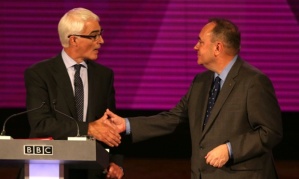A few days ago, Professor Tom Devine described George Galloway’s statements about Scottish independence as ‘talking rhetoric’. But in last night’s debate on independence between Alistair Darling (for Better Together) and the Scottish First Minister Alex Salmond, it wasn’t just talk but the way they talked that really won (or lost) the day. From the first time Alex Salmond stepped away from his podium to answer a question, right until he approached Alistair Darling and Glenn Campbell to initiate a handshake, Alex Salmond was dominating the stage.
In ancient rhetoric, the speaker must have five key characteristics: invention, arrangement, style, memory, and delivery. Each one was equally important, but perhaps delivery had the edge over the rest even then. When the ancient Greek orator Demosthenes was asked what the top three most important qualities of a speaker were, he answered: “delivery, delivery, delivery”. The Roman statesman Cicero repeats this story, as does his follower from the Roman Imperial period Quintilian.
A story of particularly brilliant delivery in the Roman period comes from the early first century BCE. A successful general, Manius Aquillius, is brought to court in 97 on a charge of extorting the people of Sicily, where he had been to end the slave revolts the year or two before. This isn’t terribly unusual in the Roman Republic. He was defended by Marcus Antonius, grandfather of the better known ‘Mark Antony’, friend of Julius Caesar. In the climactic conclusion of the speech, Antonius rips open the tunic of Aquillius to reveal his battle scars on the front of his chest. How could you convict a man who has done so much, this much, fighting for his country?

Luckily for us there was no shirt-ripping in last night’s debate, but Salmond still managed to command the arena. Salmond’s rhetorical skill has been praised before, but he wasn’t shy about putting it into practise. He moved out from behind his podium, breaking the barrier between him and the audience, allowing him to get closer to the person who asked the question. This freed his arms and body, giving him movement and space to reinforce his words with gestures. Darling, on the other hand, was trapped by his mic, stilted and clinging to the podium for safety like just another talking head. Salmond used eye contact well, too, looking between the camera and the audience, mindful of the people at home as well as the people at Kelvingrove. Leaning casually on his podium whilst Darling was answering questions, Salmond looked relaxed and confident. When he was grilling Darling, though, his stance and voice became much more aggressive and it made uncomfortable watching.
In the end, that final handshake couldn’t have made it more obvious who had won. With the credits about to roll, Salmond left his podium again at the first opportunity to shake hands with Alistair Darling, who looked stunned. It was the handshake of a winner, a magnanimous, slightly pitying “thank you for playing”. Whether Salmond can deliver an independent Scotland, I don’t know, but he can certainly deliver.

